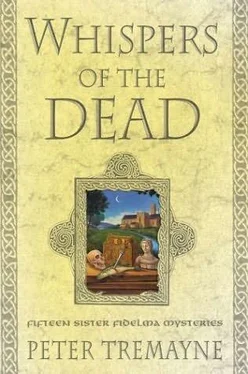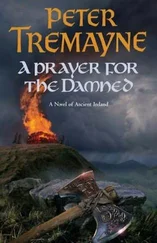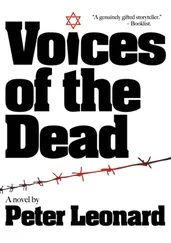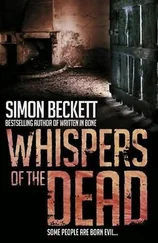Peter Tremayne - Whispers of the Dead
Здесь есть возможность читать онлайн «Peter Tremayne - Whispers of the Dead» весь текст электронной книги совершенно бесплатно (целиком полную версию без сокращений). В некоторых случаях можно слушать аудио, скачать через торрент в формате fb2 и присутствует краткое содержание. Жанр: Исторический детектив, на английском языке. Описание произведения, (предисловие) а так же отзывы посетителей доступны на портале библиотеки ЛибКат.
- Название:Whispers of the Dead
- Автор:
- Жанр:
- Год:неизвестен
- ISBN:нет данных
- Рейтинг книги:4 / 5. Голосов: 1
-
Избранное:Добавить в избранное
- Отзывы:
-
Ваша оценка:
- 80
- 1
- 2
- 3
- 4
- 5
Whispers of the Dead: краткое содержание, описание и аннотация
Предлагаем к чтению аннотацию, описание, краткое содержание или предисловие (зависит от того, что написал сам автор книги «Whispers of the Dead»). Если вы не нашли необходимую информацию о книге — напишите в комментариях, мы постараемся отыскать её.
Whispers of the Dead — читать онлайн бесплатно полную книгу (весь текст) целиком
Ниже представлен текст книги, разбитый по страницам. Система сохранения места последней прочитанной страницы, позволяет с удобством читать онлайн бесплатно книгу «Whispers of the Dead», без необходимости каждый раз заново искать на чём Вы остановились. Поставьте закладку, и сможете в любой момент перейти на страницу, на которой закончили чтение.
Интервал:
Закладка:
Abaoth’s shoulders had slumped in resignation.
Fidelma turned to Olcán who was a picture of anger as he regarded the merchant.
“Olcán,” she said sharply, “you would do well to ponder on what motivated your men to be persuaded to betray you. There is a saying that a closed hand only gets a shut fist. It is bad fortune that always attends a mean person.”
LIKE A DOG RETURNING.
It’s very beautiful,” Sister Fidelma said softly.
“Beautiful?” Abbot Ogán’s voice was an expression of disbelief. “Beautiful? It is beyond compare. Worth a High King’s honor price and even more.”
Fidelma frowned slightly and turned toward the enthusiastic speaker, a question forming on her lips. Then she realized that the middle-aged abbot was not looking at the small marble statuette of the young girl in the robes of a religieuse, which had caught her eye as she entered the chapel of the abbey. Instead, he was looking beyond the statuette, which stood at the entrance to a small alcove. In the recess, on a small altar, stood an ornate reliquary box worked in precious metals and gemstones.
Fidelma regarded the reliquary critically for a moment.
“It is, indeed, a valuable object,” she admitted. But the reliquary box was not unusual in her experience. She had seen many such boxes in her travels, all equally as valuable.
“Valuable? It is breathtaking, and inside it is the original Confessio penned in the hand of Patrick himself.” Abbot Ogán was clearly annoyed at her lack of homage before the reliquary.
Fidelma was unimpressed and not bothered at all by his look of disfavor.
“Who is the young girl whose statuette guards the entrance to the alcove?” she demanded, turning the conversation to what she considered to be the object of greater interest. Somehow the artist had brought the young religieuse to life, endowing her with a vibrancy that burst through the lines of the cold stone: It seemed that she would leap from the pedestal and greet the worshippers in the tiny abbey church with outstretched hands.
The abbot reluctantly turned from his contemplation of his community’s most famous treasure-the reliquary of Saint Patrick. His face darkened slightly.
“That is a likeness of Sister Una,” he said shortly.
Fidelma put her head to one side to examine it from every angle. She could not get over the extraordinary vitality of the piece. It was almost as if the artist had been in love with his model and only thus able to draw forth some inner feeling into the cold marble.
“Who was the sculptor?” she asked.
The abbot sniffed, clearly not approving of the interest she was showing.
“One of our brethren, Duarcán.”
“And why is her statuette in this chapel? I thought only the holy saints could achieve such honor?”
The corner of Abbot Ogán’s mouth turned down. He hesitated and then, observing the determination on Fidelma’s face, asked, “Have you not heard of the story of Sister Una?”
Fidelma grimaced irritably. It was surely obvious that she would not be asking the question had she heard the story. The abbot continued: “She was killed on this very spot some twenty years ago.”
“What happened?” Fidelma’s eyes had widened with greater interest.
“Sister Una entered the chapel when someone was attempting to steal the holy reliquary. The thief struck her down and fled but without the reliquary.”
“Was the thief caught?”
“He was overtaken.”
“How did the Brehons judge him?”
“Sister Una was very beloved by our local community.” The abbot’s features were set in deep lines, and there appeared a defensive note in his voice. “Before the culprit could be secured and taken before a Brehon for judgment, the people hanged him from a tree. This small marble statuette was erected in the chapel in Una’s honor to guard the reliquary for all eternity.”
“Who was the thief and murderer?”
The abbot again hesitated. He clearly was unhappy at her interest.
“A man who worked in the abbey gardens. Not one of our community.”
“A sad tale.”
“Sad enough,” the abbot agreed shortly.
“Did you know Sister Una?”
“I was a young novitiate in the abbey at the time, but I hardly knew her.” The abbot turned, clearing his throat as if in dismissal of the memories. “And now. . I believe that you are staying with us until the morning?”
“I will be continuing my journey back to Cashel in the morning,” Fidelma confirmed.
“Stay here then and I will send Brother Liag, our hostel keeper, to you. He will show you to the dormitory of the religieuse. We eat after Vespers. You will forgive me leaving you here. There are matters I must now attend to.”
Fidelma watched as he hurried along the aisle and vanished beyond the doors of the chapel. As they banged shut behind him, her eyes were drawn back once again to the extraordinary statuette. It held a curious fascination for her. The artist had, indeed, given the poor Sister Una life and, for a while, she was lost in examining the lines of the fine workmanship.
There was a sound behind her: a shuffle of sandals and an exaggerated cough.
She turned. A religieux had entered and stood a little distance off with his arms folded inside his robe. He was balding and wore a doleful expression.
“Sister Fidelma? I am the hostel keeper, Brother Liag.”
Fidelma inclined her head toward him. Yet her gaze was still reluctant to leave the intriguing statuette. The newcomer had observed her interest.
“I knew her.”
Brother Liag spoke softly and yet there was a curious emotion in his voice that caught her attention immediately.
“Yes?” she encouraged after a pause.
“She was so full of life and love for everyone. The community worshipped her.”
“As did you?” Fidelma interpreted the controlled emotion of his voice.
“As did I,” Brother Liag confirmed sadly.
“It is an unhappy story. I have heard it from your abbot.”
Did a curious expression flit across his features? She was not sure in the gloomy light.
“Did you also know the man who killed her?” she pressed when it seemed that he was saying no more.
“I did.”
“I gather he worked in the gardens of the abbey?”
“Tanaí?”
“Was that his name?”
“That was the man who was lynched by the community for the crime,” Brother Liag affirmed.
Fidelma exhaled softly as she gazed at the marble face of the young girl.
“What a miserable waste,” she observed, almost to herself.
“Grievous.”
“What sort of man was this Tanaí? How did he think that he, a gardener, could steal that precious reliquary and sell it-for presumably he did it for mercenary gain?”
“That was the theory.”
Fidelma glanced quickly at him.
“You do not agree?”
Brother Liag returned her gaze and his expression had not changed. It was still mournful.
“I think that we share the same thought, Sister. The only way such an object could be sold for gain is by its destruction. Where and to whom could such a priceless treasure be sold? The jewels pried from the box might be sold individually. The value of the box itself and the greater value of that which is contained in it would be entirely lost. There would be no market for anything so invaluable. Who would purchase such a treasure?”
“Yet if Tanaí was merely a laborer in the garden here, he might not have considered that aspect of the theft. He might simply have seen a precious jeweled box and been overcome by greed.”
The hostel keeper smiled for the first time, more a motion of his facial muscles than indicative of any feeling.
“It is true that Tanaí worked here as a gardener. He was an intelligent man. He had been an apothecary and herbalist. One day he mixed a wrong prescription and one of his patients died. He answered before the Brehons for manslaughter and was fined. The Brehons said it was an accident, and there was no guilt of intent involved-only the guilt of error. But Tanaí was conscientious and, although he could have continued to practice as a herbalist, he withdrew here to the abbey and did penance by returning to study the plants and herbs, living a life of penury and self-sacrifice.”
Читать дальшеИнтервал:
Закладка:
Похожие книги на «Whispers of the Dead»
Представляем Вашему вниманию похожие книги на «Whispers of the Dead» списком для выбора. Мы отобрали схожую по названию и смыслу литературу в надежде предоставить читателям больше вариантов отыскать новые, интересные, ещё непрочитанные произведения.
Обсуждение, отзывы о книге «Whispers of the Dead» и просто собственные мнения читателей. Оставьте ваши комментарии, напишите, что Вы думаете о произведении, его смысле или главных героях. Укажите что конкретно понравилось, а что нет, и почему Вы так считаете.












